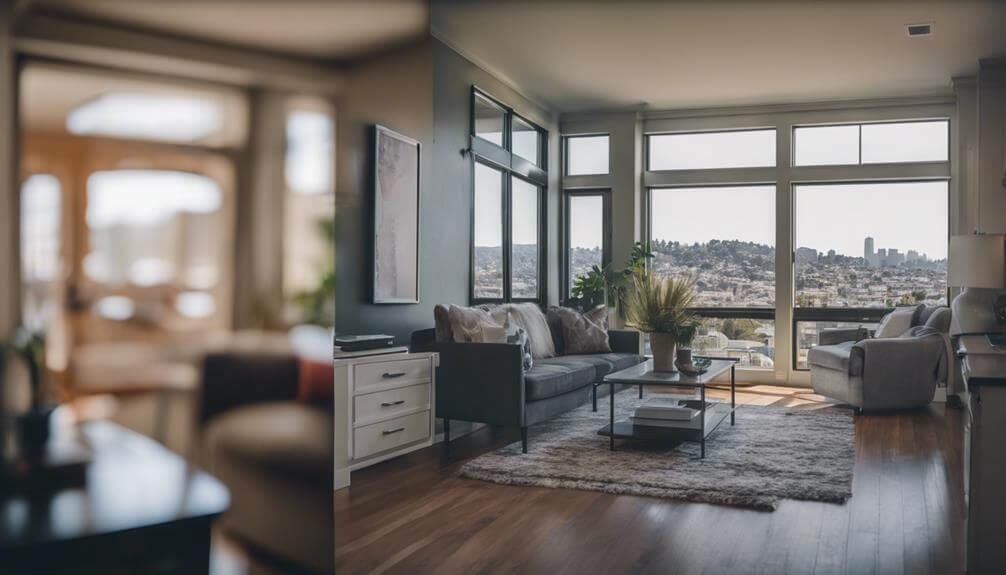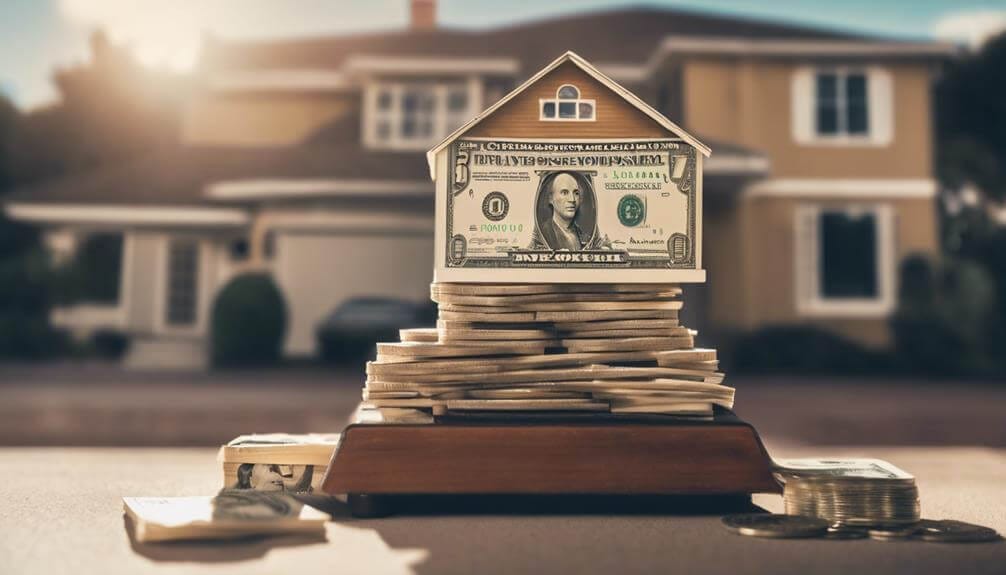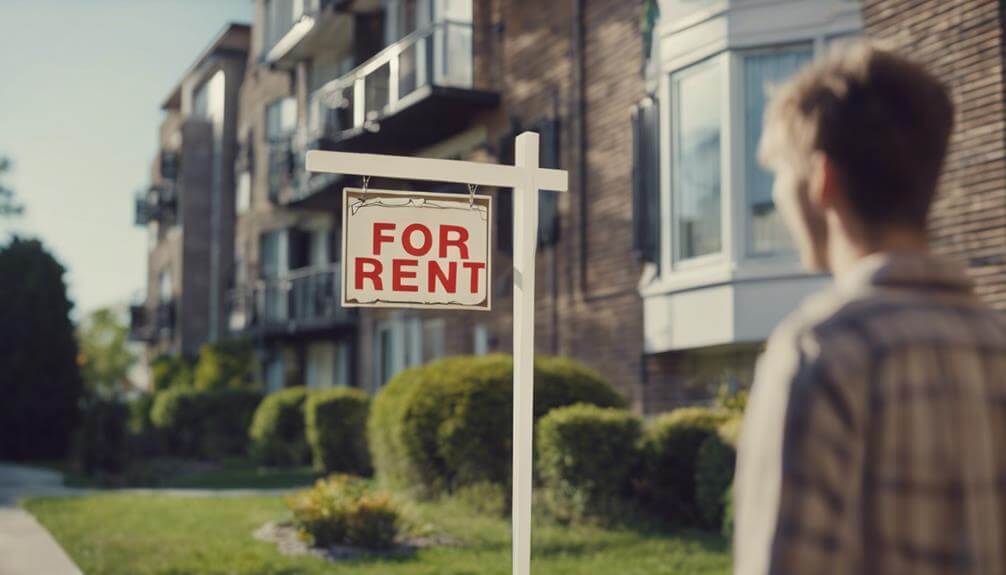In the Bay Area, deciding to rent or buy impacts your financial future. Consider high rental demand and price fluctuations. Factor in affordability, including rent, utilities, and savings through homeownership. Plan your budget and weigh the benefits: renting offers flexibility and low upfront costs; buying gives stability, equity building, and a personalized space. Think of long-term gains and tax implications. Evaluate maintenance responsibilities and investment potential. Your decision between renting and buying in the Bay Area is vital for your financial goals.
Key Takeaways
- Consider market fluctuations for informed decision-making.
- Evaluate affordability for renting and buying comparisons.
- Assess long-term benefits like equity and tax advantages.
- Analyze financial implications to align with goals.
- Factor in flexibility, maintenance, and investment potential.
Housing Market Trends

When considering whether to rent or buy in the Bay Area, understanding the current housing market trends is essential. The market conditions in the Bay Area are characterized by significant price fluctuations and high rental demand. Home prices in the region have been experiencing rapid changes, making it vital to stay updated on the latest trends.
Price fluctuations in the Bay Area housing market can impact your decision between renting and buying. These fluctuations can affect the overall affordability of purchasing a home, as prices may rise or fall unexpectedly. Additionally, rental demand plays a key role in market conditions. High rental demand often leads to increased rental prices, making buying a more financially appealing option in the long run.
To make an informed decision, keep a close eye on the market conditions and home prices in the Bay Area. By monitoring these trends, you can better assess whether renting or buying aligns with your financial goals and lifestyle preferences.
Affordability Analysis

Considering the housing market trends in the Bay Area, evaluating the affordability of renting versus buying is crucial for making a well-informed decision. When appraising renting costs, it’s crucial to take into account monthly rent, utilities, renter’s insurance, and potential annual rent increases. On the other hand, homeownership savings include equity buildup, tax deductions, and the possibility of property value appreciation over time.
Comparing these aspects directly can help you determine the financial implications of each option. Renting costs are typically more predictable, offering flexibility regarding moving and avoiding unexpected expenses like maintenance. However, homeownership savings can provide long-term financial benefits, such as building equity and potential tax advantages.
To conduct a thorough affordability analysis, consider your long-term housing goals, financial stability, and lifestyle preferences. By weighing the renting costs against homeownership savings, you can make a well-rounded decision that aligns with your current needs and future aspirations in the competitive Bay Area housing market.
Financial Considerations

To make a well-informed decision between renting and buying in the Bay Area, it’s essential to carefully consider the financial implications of each option. Budget planning plays an important role in this decision-making process. When renting, you have a clearer picture of your monthly expenses, making it easier to budget for other financial goals. On the other hand, buying a home requires a more detailed financial plan, considering not just the mortgage but also property taxes, maintenance costs, and potential HOA fees.
Investment strategies also differ between renting and buying. Renting allows for greater flexibility in investment choices since you aren’t tied down to a specific property. This flexibility can be beneficial if you prefer investing in stocks, bonds, or other ventures.
Buying a home, however, is often considered a long-term investment. While it may require a larger upfront financial commitment, over time, the property can appreciate in value, potentially providing a significant return on investment. Hence, carefully evaluating your budget and investment strategies is important in determining whether renting or buying aligns better with your financial goals in the Bay Area.
Renting Advantages

If you’re looking for the flexibility to adapt to changing investment opportunities, renting in the Bay Area offers advantages that cater to your dynamic financial strategies. When considering the Bay Area rental market, you’ll find that:
- Cost Savings: Renting often requires lower upfront costs compared to buying a property, allowing you to allocate your funds elsewhere.
- Flexibility regarding Lease Terms: Rental agreements typically offer more flexibility concerning lease length, allowing you to adjust your living situation based on your evolving needs.
- Maintenance Responsibility: Landlords are usually responsible for property maintenance and repairs, saving you time and money on upkeep.
- Amenities: Many rental properties come with amenities like gyms, pools, and communal spaces that may be costly to maintain in an owned property.
- Location Options: Renting gives you the freedom to explore different neighborhoods and living arrangements without the commitment of buying a home.
These factors make renting in the Bay Area a viable option for those seeking financial adaptability and convenience.
Buying Benefits

Investing in real estate provides long-term stability and potential financial growth in the competitive Bay Area market. When you buy a home, you aren’t just purchasing a place to live; you’re investing in your future. Homeownership perks include building equity over time, which can serve as a valuable asset. As property values increase, so does the value of your investment, allowing you to potentially make a profit when you decide to sell.
Additionally, property ownership gives you the freedom to personalize your space without having to seek permission from a landlord. You can renovate, decorate, and make changes to your home to suit your preferences and lifestyle.
Moreover, owning a home can provide a sense of stability and security for you and your family. You won’t have to worry about rent hikes or the uncertainty of having to move frequently. Instead, you can establish roots in a community and create lasting memories in a place you can call your own.
Tax Implications

When contemplating whether to rent or buy in the Bay Area, understanding the tax implications is essential for making an informed decision about your financial future. Owning a home comes with various tax benefits that can impact your financial planning. Here are some key points to ponder:
- Tax Deductions: Homeowners can often deduct mortgage interest, property taxes, and certain closing costs, potentially lowering their taxable income.
- Capital Gains Exclusion: Selling your primary residence may allow you to exclude up to $250,000 ($500,000 for married couples) in capital gains from your taxable income.
- Property Tax Deductions: Property taxes paid on your primary residence may be deductible on your federal income taxes, reducing your overall tax liability.
- Mortgage Interest Deduction: The interest paid on your mortgage may be tax-deductible, providing additional savings on your tax bill.
- Consult a Tax Professional: Given the complexities of tax laws, seeking advice from a tax professional can help you maximize your deductions and make informed financial decisions.
Equity Building

To build equity in real estate, consider how each mortgage payment contributes to your ownership stake in the property. By making regular payments, you’re gradually increasing your share of the home’s value. This process is one of the key homeownership advantages as it allows you to build wealth over time. Unlike renting, where your monthly payments only provide you with a temporary place to live, owning a home offers the potential for long-term financial growth through equity building.
Wealth building through homeownership is a strategic way to secure your financial future. As you pay down your mortgage, you’re basically investing in an asset that typically appreciates over time. This growth in property value, coupled with the reduction of your loan balance, leads to a higher level of equity.
Ultimately, this equity can be leveraged for other investments, used to fund major expenses, or provide a source of inheritance for your loved ones. Homeownership not only offers a place to call your own but also serves as a powerful tool for wealth accumulation.
Flexibility Factors

Considering the Bay Area’s dynamic real estate market, flexibility factors play an essential role in deciding between renting and buying a home. When contemplating your housing options, keep in mind the following factors:
- Lease Agreements: Rental agreements typically offer shorter terms, providing you with the flexibility to relocate more frequently if needed.
- Relocation: Renting allows for easier relocation without the hassle of selling a property in a volatile market.
- Rental Restrictions: Some rentals may have limitations on modifications or pet ownership, impacting your flexibility to personalize your living space.
- Housing Market: Buying a home ties you to the current state of the housing market, which may not offer the flexibility of easily moving if the market conditions change abruptly.
- Future Plans: Consider your future plans and how they align with your housing choice to ensure you have the flexibility needed for potential life changes.
Evaluating these flexibility factors can assist you in making an informed decision tailored to your current and future needs in the Bay Area’s real estate landscape.
Maintenance Responsibilities

Maintenance responsibilities in the Bay Area can greatly impact the overall cost of homeownership. When you own a home, you are responsible for all repair costs and property upkeep, which can accumulate considerably over time. To give you a clearer picture, here is a breakdown of some common maintenance responsibilities and their estimated costs:
| Maintenance Task | Estimated Cost |
|---|---|
| Roof Repairs | $5,000 – $10,000 |
| HVAC System Check | $100 – $300 |
| Lawn Care | $50 – $100/month |
| Interior Painting | $1,000 – $3,000 |
As a homeowner, you need to budget for these ongoing expenses to keep your property in good condition and avoid any surprises. While renting may limit your control over certain aspects of the property, it also relieves you of the financial burden of these maintenance responsibilities. Consider these factors carefully when deciding between renting and buying in the Bay Area.
Long-Term Investment

Owning a property in the Bay Area can serve as a significant long-term investment, offering potential for wealth accumulation over time. When contemplating whether to invest in real estate in this region, factors such as rental yields and property appreciation play vital roles in determining the profitability of your investment.
- Rental Yields: The Bay Area’s high demand for rental properties can result in attractive rental yields, providing a steady income stream for property owners.
- Property Appreciation: Historically, properties in the Bay Area have shown significant appreciation rates, allowing owners to build equity and potentially reap substantial profits upon resale.
- Market Stability: The Bay Area real estate market has demonstrated resilience, offering a relatively stable investment environment.
- Tax Benefits: Property ownership in the Bay Area can come with tax advantages, such as deductions for mortgage interest and property taxes.
- Portfolio Diversification: Investing in Bay Area real estate can diversify your investment portfolio, potentially reducing overall risk exposure.
Considering these factors can help you make an informed decision regarding the long-term investment potential of owning property in the Bay Area.
Frequently Asked Questions
What Are the Current Vacancy Rates in the Bay Area for Rental Properties?
Currently, vacancy rates in the Bay Area for rental properties are low due to high demand. Rental trends show a competitive rental market with increasing housing prices. Consider these factors when deciding between renting and buying.
Are There Any Specific Neighborhoods in the Bay Area That Are More Favorable for Renting or Buying?
In the Bay Area, specific neighborhoods vary in favorability for renting or buying based on dynamics like affordability and demographics. Stay informed about rental market trends and explore areas that align with your preferences.
How Does the Commute Time and Transportation Options in the Bay Area Affect the Decision Between Renting and Buying?
You’d think the Bay Area commute is a breeze, right? Well, the reality hits hard with sky-high housing prices affecting your decision. Public transportation could be a savior, making the renting or buying dilemma more manageable.
Are There Any Unique Regulations or Laws in the Bay Area That Impact Renting or Buying a Property?
When you consider the Bay Area, remember that impactful regulations and unique laws can affect your choices. Be aware of rental restrictions and buying limitations that might shape your decision-making process in this region.
How Does the Availability of Rental Properties Compare to the Availability of Homes for Sale in the Bay Area?
When it comes to rental demand versus housing supply in the Bay Area, it’s like searching for a needle in a haystack. Renting trends show high demand, but home ownership offers limited options due to low supply.
Conclusion
As you navigate the turbulent waters of the Bay Area housing market, remember that renting and buying are like two ships passing in the night. Each option has its own advantages and drawbacks, but ultimately, the decision is yours to make.
Whether you choose to sail the seas of renting or anchor down with homeownership, may your journey be filled with smooth sailing and prosperous shores ahead.
Fair winds and following seas, dear reader.



















